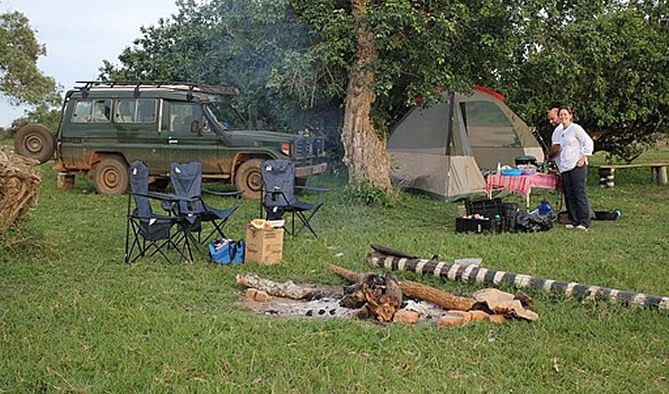
Hitting the road and drive a far-deep upcountry to explore Uganda is the best living in this nation. The confusion and clamor of Kampala rapidly blur away to lavish landscape and slower, loosened up the pace of life. For those hoping to experience the most on a budget, Uganda’s National Parks offers one of the cheapest and simplest ways to associate with nature. It’s not for the faint of heart, yet bush camping in Uganda can give you a memorable lifetime experience.
Now justifiably, setting up an easy nylon tent in a national park brimming with the world’s most prominent predators may appear to be an absurd idea at best. However, there are some basics and bolts about bush camping that may mitigate your nerves. The first is that you should imagine what a tent looks like for an animal. Like a tree or rock, a tent is essentially a structure. Also, similarly, as elephants don’t go smashing into the sides of rocks and hyenas don’t simply stroll through trees, it is exceedingly unlikely that an animal will test the auxiliary honesty of your tent.
“In the event that you remain in the tent, you will be fine,” the Uganda Wildlife Authority (UWA) ranger guide in Murchison Falls National park, tells us. “Getting out during the night when you hear an animal passing? You should use caution. Yet, the tent is safe”. The UWA guides have spent a lot of nights depending on this strategy for their own safety. While most park rangers are provided with legitimate bandas or housing while living in a national park, they spend most of the nights out in the national park, either watching for poachers (undeniably more perilous than any creature in the African parks) or going through the night with the tourists, who, depending on the national park, will be provided with an armed ranger throughout the night.
The other part that makes camping in the bush safer is Fire. Wild animals are naturally fear fire. From hippos to lions, they know it implies devastation and death and will stay away from it. Set up camp amid the day and arrange the fire pit so it is prepared to pass by sunset. In many parks, UWA guides will come around and light it for you, obviously, you are free to make your own.
Along these lines, now you’re sitting in the national park and night has fallen. You have set your fireplace, tent, and now what? Consider the possibility that animal approaches. Initially, one needs to recall this isn’t a zoo. You are on another animal’s territory, and you presumably will see, or possibly hear something. Once more, we refer to another ranger guide of UWA, for his expertise. “In case a lion came near you, or a buffalo or anything,” the ranger says, “the most exceedingly bad thing you can do is run. You will look like prey. In case you see something, be quiet and step back slowly. Look for shelter in your vehicle or another closed structure.”
One camper we talked with ran into the leopard and two lions when camping in Queen Elizabeth National park. “I just remained sitting by the fire.” he says, “There were two male lions in heat and they were pursuing around a female. Their thunders do shake you deeply. The sound carries so well and it’s difficult to tell where they are. At that point I would simply observe one, walking simply out of the firelight. I stayed put alongside the fire and viewed. It was better than any game drive I’ve ever been on, and after that night, I wouldn’t go through the night in the lodge if you paid me.”
Another risky thing you should avoid is keeping food in the tent and you also have to close your tent well. This advice was given to us by any experienced camper we met in Lake Mburo National Park. Most attacks happen when either the flaps are left open (hyenas are curious and will investigate an open tent. But in case it’s just you and the sleeping bags, these animals will be more bored. People mostly don’t provide a similar greasy feast as, say a cob, zebra, or antelope. You are viewed as slightly pointless to eat.”
Still not persuaded? There is one minor piece of information that may comfort you: while local people and visitors alike have at times been killed by a solitary buffalo attack or hippo encounter, no vacationer has ever been attacked and killed by a predator while on a camping safari in the country.
